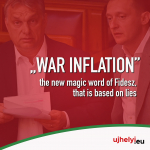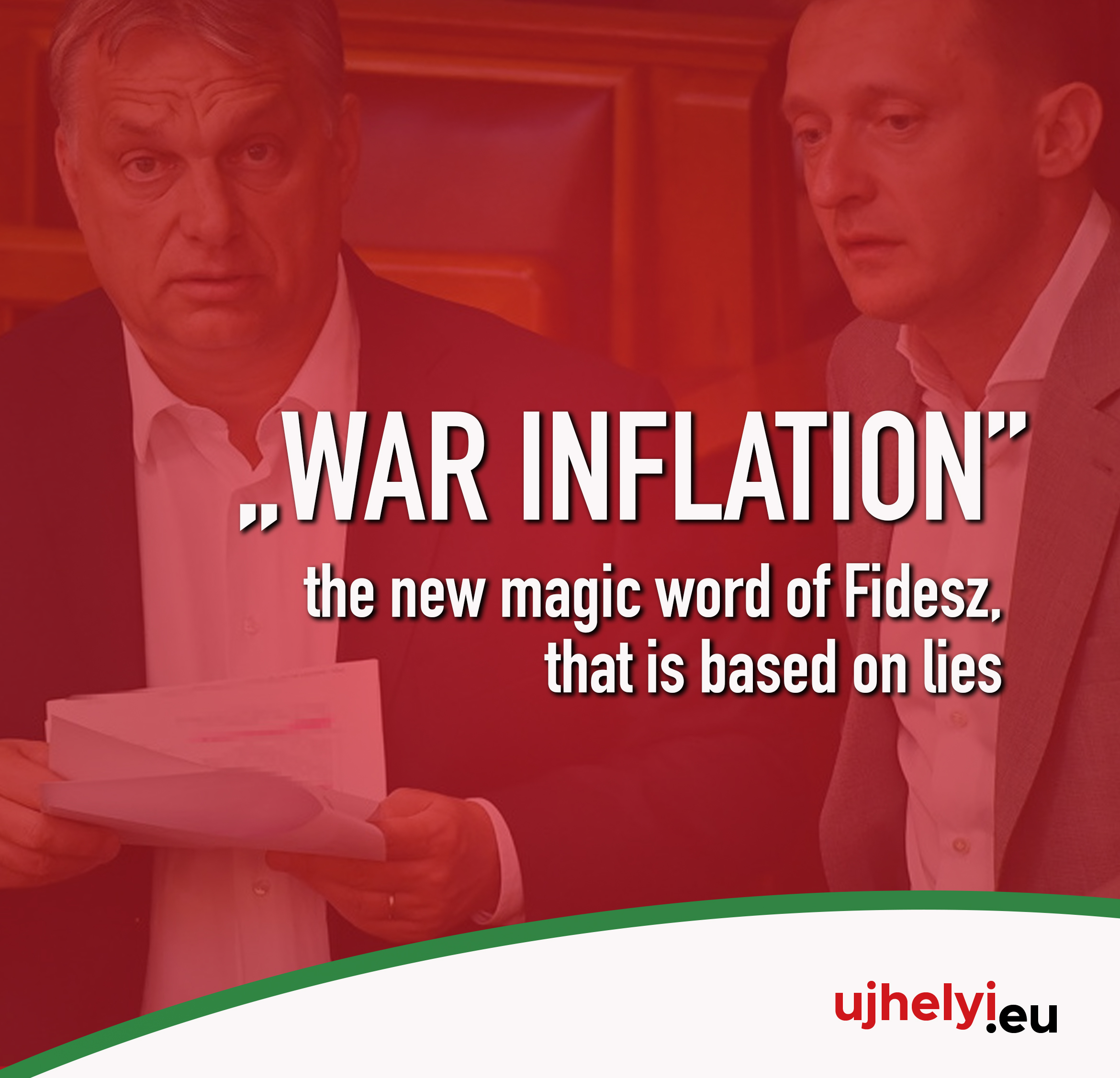Published: 18.7.2022
 Clearly and unambiguously, as the economic crisis deepens, the NER (Orbán’s so-called national Cooperation System) is starting to crack under the weight and untenability of its own lies, and while it may be able to keep on deceiving some of the population with the image of their made-up enemies for a while, reality will soon come knocking on everyone’s door. And it will hurt. In fact, the best thing Fidesz could do to protect families and the country would be to be honest for once. „War inflation” is the new all-purpose catch phrase used to explain the increasingly harsh austerity and cash-grabs to voters, blaming Putin’s aggressor war and the ‘misguided Brussels sanctions’; for skyrocketing food prices and for leaving the official price cap as the only way to keep fuel costs down, in other words, war and Brussels are the sole cause of everything bad. However, this is a blatant, vicious and simplistic lie, the only purpose of which is to make the government absolve itself of all responsibility. In reality, the current situation is largely the result of Fidesz’s over-spending, socially insensitive, climate crisis-denying, oligarch- and big-capital-friendly economic policies.
Clearly and unambiguously, as the economic crisis deepens, the NER (Orbán’s so-called national Cooperation System) is starting to crack under the weight and untenability of its own lies, and while it may be able to keep on deceiving some of the population with the image of their made-up enemies for a while, reality will soon come knocking on everyone’s door. And it will hurt. In fact, the best thing Fidesz could do to protect families and the country would be to be honest for once. „War inflation” is the new all-purpose catch phrase used to explain the increasingly harsh austerity and cash-grabs to voters, blaming Putin’s aggressor war and the ‘misguided Brussels sanctions’; for skyrocketing food prices and for leaving the official price cap as the only way to keep fuel costs down, in other words, war and Brussels are the sole cause of everything bad. However, this is a blatant, vicious and simplistic lie, the only purpose of which is to make the government absolve itself of all responsibility. In reality, the current situation is largely the result of Fidesz’s over-spending, socially insensitive, climate crisis-denying, oligarch- and big-capital-friendly economic policies.
Due to the extremely noisy and impulsive period of the last few years, only few people remember that Viktor Orbán announced the introduction of the official price of fuel in November last year, after the price of petrol had risen above the so-called ‘psychological threshold’ of 500 forints due to the ever-rising inflation. Equally important is the date of the official price cap introduced for a particular range of basic foodstuffs: on 12 January this year, the Prime Minister announced in a Facebook video that the price of, for example, granulated sugar and chicken back would be fixed at the price of October last year. By comparison, the Russian invasion started well after these announcements, on 24 February this year; in other words, the war, although it has obviously had a significant impact on changes in the world economy since then, only entered the picture much later in connection with the grossly inflated Hungarian economy. To claim this as the sole cause is therefore an obvious hoax. Not to mention the fact that the continued plunge of the forint and the deepening of the economic crisis are clearly linked to the senseless battle with the European Community and the resulting lack of frozen aid, and nothing else. It was already evident during the covid pandemic that Fidesz’s policy-making machinery, which is thought to be super professional, is also prone to breaking down when they have to defeat a real enemy and not one that they themselves have declared, painted on the wall and moved around to scare the public with it. The increasingly severe economic crisis has also now noticeably kicked the NER in the knee, and the lack of EU funding has caused concrete dysfunction and haste in the system. What is now coming cannot be covered up or explained away by a sea of fake public media, posters and well-written political slogans. Even the most sincere Fidesz supporter will see that it was not George Soros who sneaked in and ate out his fridge in mid-month, it was not „LMBTQ-lobbying Brussels bureaucrats” who re-wrote the price tags with thick markers at the corner shop, and it was certainly not „treasonous liberals”; who caused the collapse of family or self-employed small businesses.
Fidesz can do two things if it truly has the interests of Hungarian families at heart. For once in its life, it could be honest and stop making bogus excuses and constantly pointing fingers at others. Hungarian people deserve a real picture and a real explanation for the serious, negative changes in their lives. With a fourth two-thirds, perhaps they can afford to finally be honest. And secondly, it is high time the government at least partially implemented the MSZP’s „security of livelihood package”; which would provide rapid and crisis-resilient assistance to the most vulnerable social groups in an increasingly acute social crisis. The illiberal state has not been known for its social sensitivity, for helping the excluded and those in trouble; but now we are entering a period when it is a clear duty to provide just and genuine help to those in need, in line with social democratic values. If we were in a position to decide, we would certainly do so.
dr. István Ujhelyi
Member of the European Parliament
17 July, 2022.
